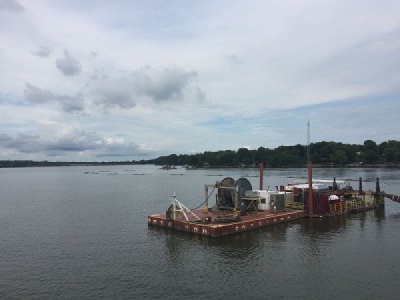
Posted on September 26, 2018
It stems from an issue involving the capacity of the basin near Oakley where the silt and water taken from the bottom of the lake is pumped.
Late last year, it was discovered that the site wasn’t big enough to see the project through to its earlier than contracted end, causing an additional cost – a total of $2.7 million – to increase the site’s capacity through the construction of higher berms.
A total of 3,831 pages of documents obtained by the Herald & Review through the Freedom of Information Act show a disagreement between the project engineering firm, Chastain and Associates, and the dredging company, Great Lakes Dredge & Dock, when it comes to the sediment basin.
Questions raised in the various correspondence include why the basin filled up while an additional 2.7 million cubic yards of material was still needing to be removed to meet the requirements of the project; who was responsible for monitoring how much material was entering the storage facility and how much space it was taking up; and the speed at which the material was being added to the site and whether that played a role in it filling up faster than expected.
In one document, an unidentified contractor questioned the capacity of the basin before the project began and was assured by Chastain and Associates that it was big enough.
OUR VIEW: ‘Kids these days’ and Central Illinois schools canceling classes because of heat
A third-party engineering firm, Klingner Associates, was called in to review the process that led up to late improvements and identified some key oversights. It was determined no one involved in the project had collected data to determine how much material was going into the Oakley basin, the make-up of the sediment being pumped out by the dredgers, and how much water has successfully trickled back into the lake, an important component of the project.
We’re not engineers, so we’re not in a position to say matter of factly if Chastain and Associates or Great Lakes Dredge & Dock is more to blame.
What we do know is the city of Decatur taxpayers and water customers aren’t at fault and shouldn’t bear the brunt of the additional costs.
Anyone who has dealt with a contractor knows the drill.
You have a project that you don’t have the skills or ability to do yourself. You go into the marketplace and select the companies you deem best for the job based on the skills and references they bring to the table.
Most projects include a surprise or two, and sometimes they bring additional costs.
In this case, it appears the issues could have been identified before the project got underway or soon into the process. Instead it became an emergency fix, which likely added to the cost.
This isn’t the city of Decatur’s fault and they shouldn’t pay the full bill as if it was.
Source: Herald&Review





